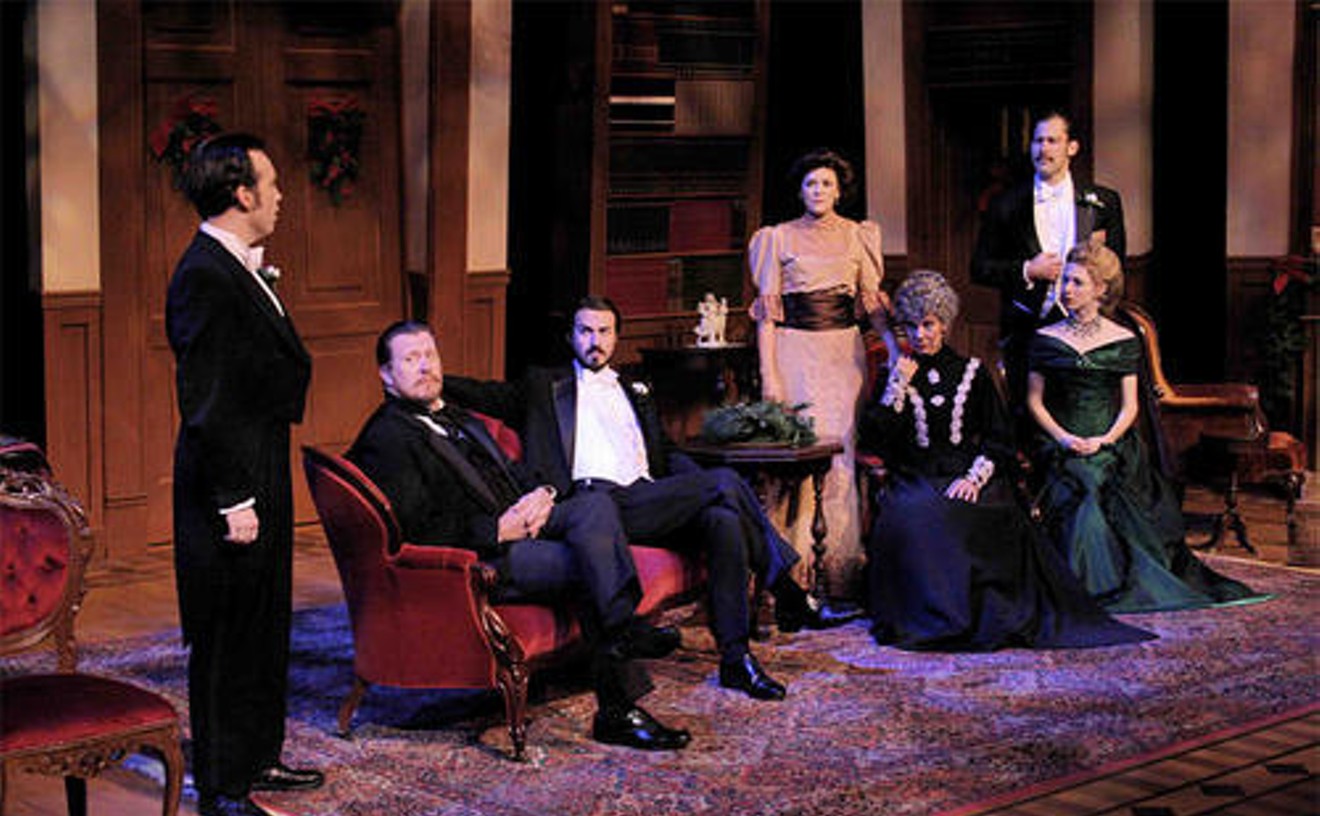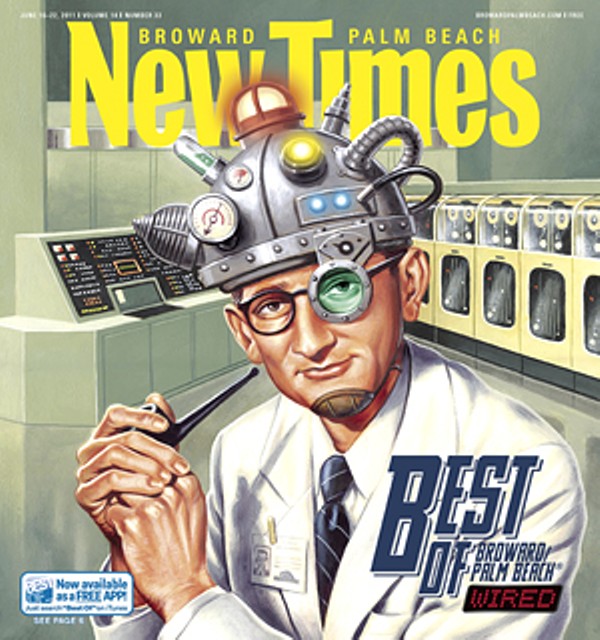Enter any discussion about Hallandale Beach's city government and you'll find yourself surrounded by bickering. Taxes are going up and parks are going to ruin while the city manager makes a cool half-million a year. Mayor Joy Cooper is a polarizing figure, to put it nicely (she's one of the loudest boosters for red-light cameras), and Commissioner Keith London seems bent on making her life hell. Into all this enters Mike Butler, a soft-spoken, well-tanned resident who looks like he wandered off a yacht and into City Hall, where he relentlessly questions the city's business deals and posts damning information on his blog. "Mike Butler doesn't shoot from the hip; he shoots the facts," quips London, who often circulates Butler's posts at City Commission meetings. He doesn't look like your typical gadfly, and he doesn't shout like your typical Hallandalian. Which is, all in all, for the best.
Best Political Activist
Cal Deal
What are activists if not simply the kinds of public citizens demanded of any good democracy? In a perfect world, all of us would be watching our local governments — and discovering their outrageous shenanigans. But it's amazing the kind of impact one good activist can have on a place. Look at Cal Deal in Fort Lauderdale. The graphics editor and former newspaperman keeps an eagle eye not only on local politicians but on every aspect of his city. When a road construction project unfairly hurt a neighborhood florist, it was Deal who stepped up to get the lackadaisical city officials to help her out. When a prescription pill mill was opened in his Fort Lauderdale neighborhood by a former heroin trafficker, it was Deal who got out his trusty camera and documented the comings and goings. And it was Deal who pointed out that the taxpayer-financed North Broward Hospital District actually gave the pill mill some extra parking spaces to use. In the end, the hospital district finally rescinded the spaces due to Deal's diligence. But it's not just the ugliness of Broward County that attracts Deal but its beauty as well. When the so-called "super moon" rose over the ocean, it was Deal sharing stunning photos of the event with media members and the public. And that's the key to understanding Cal Deal — he's just a guy who cares enough about the place he lives to do something about it.
Best Art Gallery
Galerie Jenner

Opening a new art gallery in South Florida might be likened to throwing yourself into a shark-filled tank — the odds are against you. Which makes what Jeremiah Jenner has done even more remarkable. First the photographer survived a lengthy waiting list to snag his own space at Fort Lauderdale's Sailboat Bend Artist Lofts. But instead of using that space as both studio and residence, the way his neighbors do, Jenner did something more daring, as in opening his own little gallery. And with just a handful of shows under his belt, he has established himself as a force to be reckoned with locally. Topnotch artists contribute to his exhibitions, which he hangs with as much attention to detail as any of his competition. And perhaps best of all, Jenner has resisted what must be an enormous temptation to make the gallery a showcase for his own work, instead focusing on attracting and nurturing as many artists as he can.
- 1310 SW Second Court, Fort Lauderdale, 33312 Map
- 954-728-3484
- www.sailboatbendartists.com
Best Actress
Karen Stephens
Too often, the single-actor, multicharacter show is a compromised novelty, inherently restricted by the limitations of both the performer — who can't handle the enormity of the undertaking — and the playwright, who doesn't spend enough time on each character to develop him or her in three dimensions. Sarah Jones' Bridge and Tunnel shattered both of these preconceived notions in its short run at the Women's Theatre Project. Karen Stephens was a revelation, portraying 14 characters inhabiting New York City's diverse melting pot. She played men and women, blacks and whites, Jews and Muslims, elderly yentas and aspiring rappers, all brought together under the creative auspices of an open-mic poetry night. Each of Stephens' avatars spoke, dressed, and emoted with the utmost authenticity, hoisting the bar for how successful these otherwise-gimmicky shows can be.
Best Comedian
Jessica Gross
She plays often — but not often enough — at the National Lampoon Underground Comedy Club and at the Fort Lauderdale Improv. And she regularly gets more laughs than the touring headliners. "This is cozy," Jessica Gross recently told an audience at National Lampoon's. "I feel like we're on an awkward, uncomfortable orgy-date... where people come to talk about their problems onstage." Jessica is sweet in that unassuming-but-still-might-shank-you sort of way. And she's pretty: nearly six feet tall, with dark hair cropped at her shoulder; smart, rectangular-framed glasses; and usually some sort of brightly colored attire. But her jokes pack a brutal, hilarious punch. She moves graciously from the topic of midgets to poop to UTIs. She can make a frat boy blush and a grown woman shoot cranberry and vodka out of her nose. She also has her own web series, The Adventures of a Sexual Miscreant. If you enjoy laughing even when you think you probably shouldn't, it's definitely worth checking out.
Best Public Restroom
The Museum of Art|Fort Lauderdale Second-Floor Women's Bathroom

The public bathroom is rarely a place to marvel. This one, however, has been modernized to fit its museum location. The sinks are sleek steel faucets that drip water onto a slab of pearly white marble. The water then disappears into an invisible drain, much like a water fountain. The bathroom walls and floors are made out of Formica, and the toilets flush themselves. At the far end of the bathroom is a frosty glass door, but it's suspected that it is not a magical portal, though it is a little mesmerizing.
- 1 E. Las Olas Blvd., Fort Lauderdale, 33301 Map
- 954-525-5500
- www.moaflnsu.org
Best Actor
Ricky Waugh

Like our Best Actress choice, Ricky Waugh took on the challenge of more than one character in Mosaic's difficult antiwar drama; like Bridge and Tunnel, it's a clear showcase role. Waugh made a seamless transition between two characters — a jocular gay actor and his estranged twin brother, an Iraq War soldier with a demeanor as serious as an IED. Each character has the complexity of multiple people, and Waugh's transformation from one to the other and back again was miraculous in its dedication to realism. As Craig, the troubled soldier, Waugh needed few lines of dialogue to transmit his emotions. The monstrous glare from his eyes pierced through us like a bayonet, and his twitchy upper lip suggested a fount of instability that no wife, even one as patient as costar Erin Joy Schmidt, could alleviate.
- 12200 W. Broward Blvd., Plantation, 33325 Map
- 954-577-8243
- www.mosaictheatre.com
Best Curator
Jane Hart

Mark Twain once said that when your work speaks for itself, don't interrupt. That might serve as a credo for Art and Culture Center curator Jane Hart. Like most of her counterparts at other museums and galleries, Hart keeps a low profile. You won't find her name plastered on the wall at the entrance to the shows she puts together, although you will find her slipping quietly in and out of exhibitions, receptions, and other art-related events all over South Florida, keeping her finger on the pulse of the artistic community she both serves and observes. She's easily the most adventurous curator on the scene at the moment, pulling in such challenging figures as Croatian artist Sinisa Kukec, Turkish-American Stephan Turgel, and regional artists like Michelle Weinberg, Louise Erhard, and Cristina Lei Rodriguez. She's also a pivotal player in the center's big annual fundraising raffle, "Abracadabra," which this year she staged with great flair in collaboration with Miami gallery owner Anthony Spinello.
- 1650 Harrison St., Hollywood, 33020 Map
- 954-921-3274
- www.artandculturecenter.org
Best Director
Margaret Ledford

Richard Jay Simon directs most plays at Mosaic, but this stellar work about two ambitious, jealous, female frenemies required the directorial hand of the fairer sex. So Simon called upon Margaret Ledford, resident director at Davie's Promethean Theatre, to helm this stunner, heralded by most area critics as one of the best productions of the year. Barbara Bradshaw, as the play's aging author and literature professor whose young protégé covertly mines her life for material, could probably read an entire Senate bill and make it compelling. But Ledford deserves credit for maintaining interest in every second of this play, from the way the two performers carried themselves to the silences between exchanges to the subtlest character-building gestures. That she can go from her last work, the hectic and ridiculous Cannibal! The Musical, to an intimate chamber piece such as this is a testament to one of the community's most unsung talents.
- 12200 W. Broward Blvd., Plantation, 33325 Map
- 954-577-8243
- www.mosaictheatre.com
Best Supporting Actor
Michael McKeever

Michael McKeever earned the Caldwell Theatre's sole award nomination in the Carbonell, the local yearly awards for theater. And for good reason. In an imperfect supporting cast — some of whom phoned in their performances — McKeever was the anchor of the unsteady ensemble. Like many in the cast, he played multiple parts, all of them doctors, all of them convincing, all of them chattering through obtuse psychological and medical jargon with convincing, Kafkaesque absurdity. His pièce de résistance, and the highlight of the entire show, occurs when one of his doctor characters removes his hairpiece and breaks the fourth wall, addressing the audience about his personal history with attention-deficit disorder. "He really does have ADD," a woman in the audience whispered. McKeever doesn't, though — he's just that good an actor.
- 7901 N. Federal Highway, Boca Raton, 33487 Map
- 561-241-7432
- www.caldwelltheatre.com





